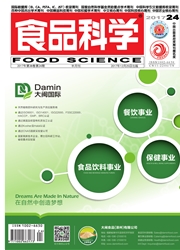

 中文摘要:
中文摘要:
目的:研究水溶性黑灵芝多糖(awater-solublepolysaccharidesfromGanodermaatrum,PSG)-1体内抗炎活性及对甘露糖受体(mannosereceptor,MR)表达的影响。方法:腹腔注射脂多糖(lipopolysaccharide,LPS)建立小鼠体内炎症模型,随机分为5组:正常对照组、LPS组、PSG-1(高、中、低剂量,分别为100、50、25mg/(kg·d))+LPS组。流式细胞仪检测巨噬细胞中MR表达、吞噬功能及活性氧(reactiveoxygenspecies,ROS)生成,用酶联免疫吸附测定(enzyme-linkedimmunosorbentassay,ELISA)分析血清中肿瘤坏死因子(tumornecrosisfactor,TNF)-α、白细胞介素(interleukin,IL)-1β和IL-6的含量。结果:与正常对照组相比,LPS组腹腔巨噬细胞表面MR表达量下降,与LPS组相比,PSG-1+LPS组腹腔巨噬细胞表面MR表达量极显著增加(P<0.01);与正常对照组相比,LPS组腹腔巨噬细胞吞噬能力和ROS生成增加,与LPS组相比,PSG-1+LPS组腹腔巨噬细胞吞噬功能和ROS生成显著降低(P<0.05,P<0.01);与正常对照组相比,小鼠经LPS处理后,血清中TNF-α、IL-1β和IL-6的分泌水平极显著升高(P<0.01);与LPS组相比,小鼠灌胃PSG-1后,PSG-1(高剂量)+LPS组中TNF-α的含量显著降低(P<0.05),IL-1β和IL-6的分泌水平无显著差异。结论:PSG-1具有抗炎作用,可部分抑制LPS诱导的体内炎症,其机理与PSG-1促进小鼠腹腔巨噬细胞表面MR的表达、抑制巨噬细胞向M1型极化有关。
 英文摘要:
英文摘要:
Objective:To explore the in vivo anti-inflammatory activity of a water-soluble polysaccharide purified fromGanoderma atrum,named PSG-1,and its effect on mannose receptor(MR)expression.Methods:In the present study,lipopolysaccharide(LPS)via intraperitoneal injection was applied to establish a mouse model of inflammation.Mice wererandomly divided into five groups:control group,LPS group,high-dose PSG-1(100mg/(kg·d))+LPS group,mediumdosePSG-1(50mg/(kg·d))+LPS group and low-dose PSG-1(25mg/(kg·d))+LPS group.MR expression,phagocytosisand the level of reactive oxygen species(ROS)in macrophages were analyzed by flow cytometry.The levels of tumornecrosis factor-α(TNF-α),interleukin-1β(IL-1β)and interleukin-6(IL-6)in serum were determined by enzyme-linkedimmunosorbent assay(ELISA).Results:Compared with the control group,MR expression on the macrophage surfacewas decreased in the LPS group.In contrast,MR expression on the macrophage surface was significantly increased inthe PSG-1+LPS group in comparison with the LPS group(P<0.01).Macrophage phagocytosis and the level of ROS inthe LPS group were higher than in the control group,which were significantly decreased after administration of PSG-1(P<0.05,P<0.01).After mice were administrated with LPS,the levels of TNF-α,IL-1βand IL-6were significantlyincreased in serum in comparison with the control group(P<0.01).Compared with the LPS group,the expression levelof TNF-αwas significantly decreased after administration of high-dose PSG-1(P<0.05),but the expression levels ofIL-1βand IL-6did not significantly change.Conclusion:PSG-1had an anti-inflammatory effect,being able to partlysuppress inflammation induced by LPS in vivo,by promoting MR expression on the peritoneal macrophage surface in miceand suppressing macrophage polarization to M1phenotype.
 同期刊论文项目
同期刊论文项目
 同项目期刊论文
同项目期刊论文
 期刊信息
期刊信息
